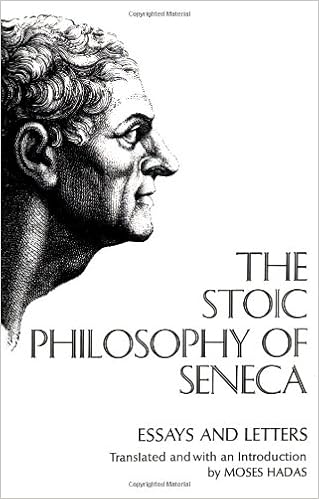
Lately, I have been reading the letters and short essays by the Roman philosopher, Lucius Annaeus Seneca, 4 BCE - 65 CE. Seneca was a wealthy Roman, influential writer, political advisor, and aristocrat. Many consider him a Stoic. He was raised and educated in Rome. Once, he was banished to Corsica for seven years; and, later, ordered to commit suicide by the Emperor Nero.
"We should cherish old age and enjoy it. It is full of pleasure if you know how to use it. Fruit tastes most delicious when its season is ending. The charms of youth are at their greatest at the time of its passing. It is the final glass which pleases the inveterate drinker, the one that sets the crowning touch on his intoxication and sends him off into oblivion. Every pleasure defers till its last its greatest delights. The time of life which offers the greatest delight is the age that sees the downward movement - not the steep decline - already begun; and in my opinion, even the age that stands on the brink has pleasures of its own - or else the very fact of not experiencing the want of any pleasures takes their place. How nice it is to have out-worn one's desires and left them behind."
- Seneca, Letters, XII, p. 37 in the Campbell translation; online version by R. M. Gummere.
Letters from a Stoic. By Seneca. Translated with an introduction by Robin Campbell. Illustrated by Coralie Bickford-Smith. Hardcover Classics Series. New York, Penguin Classics, Reissue Edition, 2015. Index of persons, appendix, notes, 352 pages. ISBN: 978-0141395852. VSCL.
Seneca The Stoic Philosophy of Seneca: Essays and Letters
 . By Seneca. Translated with and introduction by Moses Hadas. New York, W. W. Norton, 1958, 1968. 261 pages. ISBN: 0393004597. VSCL.
. By Seneca. Translated with and introduction by Moses Hadas. New York, W. W. Norton, 1958, 1968. 261 pages. ISBN: 0393004597. VSCL.
Stoicism: Bibliography, Links, Notes, Quotations, Reflections, Resources.
A hypertext notebook by Michael P. Garofalo.
Personally, I favor the metaphysics and natural philosophy of the Epicureans over the Stoics. The Stoics remind me of the Confucians, and the Epicureans remind me of the Taoist thinkers of around 300 BCE.
A hypertext notebook by Michael P. Garofalo.
Personally, I favor the metaphysics and natural philosophy of the Epicureans over the Stoics. The Stoics remind me of the Confucians, and the Epicureans remind me of the Taoist thinkers of around 300 BCE.

No comments:
Post a Comment